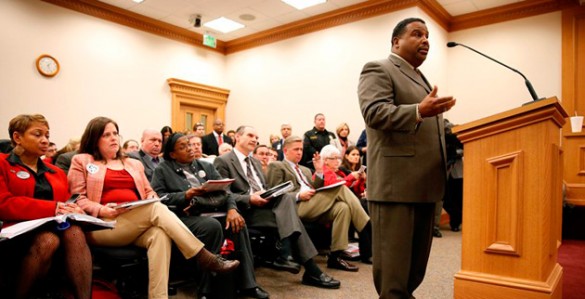
Legislation under consideration by state lawmakers that would strip Vanderbilt University’s right to field a commissioned police department as long as it enforces its nondiscrimination policy was called “constitutionally suspect” by the state attorney general.
The opinion, released March 13 by Attorney General Robert E. Cooper Jr., came the day after brief statements before a House education subcommittee featuring three Vanderbilt students and Vanderbilt Police Chief August Washington.
“To attach this bill to the police department actually threatens public safety,” Washington said. “To remove a complete police department is just irresponsible. And I ask you to vote against this bill.”
In a letter to the House education subcommittee sent March 11, Dean of Students Mark Bandas urged legislators not to move forward with the bills.
“As members of the campus community, VUPD’s officers understand the challenges college students can face – whether they are external challenges or, frankly, ones of students’ own making as they learn to live away from home for the first time and make their own decisions. This unique understanding of campus life and insight into the minds of college students, coupled with their being highly trained, commissioned police officers make VUPD invaluable,” Bandas said.
“I greatly appreciate the work VUPD does with my staff to keep our campus safe and to minimize risk for our students, as well as for faculty, staff and visitors to our campus and the surrounding community,” he continued. “However, the reality is that sometimes, unfortunately, tragedies like those at Virginia Tech and in Newtown, Conn., happen.
“While we hope to never have to call on VUPD for situations like these, having a highly trained police force right on campus that is held to the same standards as municipal law enforcement can make a difference.”
Hearings on both the House and Senate versions of the bill (HB1150/SB1241) were delayed for a week in anticipation of the attorney general’s ruling.
In his opinion, the attorney general argues, “It is well-established that the State may not condition continued receipt of a valuable state benefit (here, the exercise of the State’s police power to commission and maintain a police force) on a private institution’s compliance with an unconstitutional condition. Because SB1241 arguably imposes an unconstitutional condition, it is facially constitutionally suspect.”
Rebekah Austin, a junior electrical engineering major and president of the Wesley/Canterbury Fellowship at Vanderbilt, praised Vanderbilt police officers for keeping the campus safe, and said the nondiscrimination policy “also makes me feel safe on campus.”
“It means that I can walk into any university-sponsored club meeting or organization and know that I am welcomed there,” she said. “Our religious group has continued to operate on campus, and there are many Christian and non-Christian groups on campus that continue to operate and thrive on campus.”
Students Justin Gunther and Abby Sutton spoke in favor of the bills, stressing their opposition to Vanderbilt’s nondiscrimination policy.